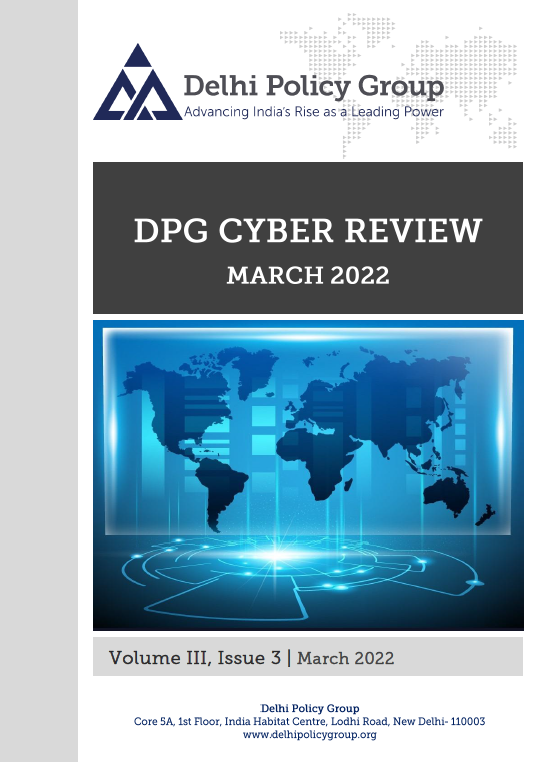Vol. III, Issue 3
Date: April 03, 2022
The Russia-Ukraine War which has been ongoing since February 24 has not witnessed high-profile cyberattacks. However, social media platforms along with other electronic media have become dominant weapons for Information Warfare. India’s dependence on western platforms, which have taken several partisan and unilateral actions, has impacted its cyber space during the war. This has brought to fore the need for “Atmanirbhar Internet” and self-reliance.
India’s cyberspace continues to be plagued by cyber incidents, with more than 212000 cybersecurity incidents reported by the Indian Computer Emergency Response Team (CERT-In) in 2022. The growing expansion of India's cyber threat canvas is primarily dominated by persistent cyberattacks from Pakistan and China.
India has joined the European Union and nine other countries for fostering international cooperation to promote data protection and privacy standards across the Indo-Pacific region and Europe, with harmonised legal and policy frameworks for trans-border flows of data with trust. India’s own data privacy law, in the making since 2019, is now set to get Parliament's approval by the monsoon session in 2022.
India’s plans to roll out 5G by August 15 will be feasible only if the basic issues of Frequency Spectrum, Security testing of network equipment to identify “trusted products”, indigenisation of hardware and software, and finally, infrastructure development are taken up in earnest.
On the international front, the Russian-Ukraine War has thrown up the challenges of massive dis-information campaigns and economic sanctions, providing opportunities to technology platforms to weaponise the internet and catalysing moves towards nation states adopting alternative governance frameworks. Innovative adoption of commercial technology and crowd sourcing by Ukraine has shown results against the asymmetric kinetic onslaught by Russia.
The Australian Government has pledged A$9.9 billion ($7.4 billion) for a Project named REDSPICE (Resilience, Effects, Defence, Space, Intelligence, Cyber, and Enablers), that will significantly expand the Australian Signals Directorate’s offensive cyber capabilities and defensive resilience to meet challenges from adversaries.
The US and the European Commission President announced an agreement on data privacy and trans-Atlantic data flows with trust and security to protect data of European citizens. The EU enacted a Digital Markets Act to protect citizens from large technology companies that collect data from different services to offer targeted advertisements without users’ consent.
At the 14th India-Japan Annual Summit held in New Delhi, the two Prime Ministers reviewed areas of digital cooperation with a view to enhancing the digital economy.
The Quad Senior Cyber Group met in Sydney to review measures to expand cybersecurity cooperation and strengthen cyber resilience and critical infrastructure protection in the region. The meeting followed decisions taken by the Quad leaders at their summit on March 3.
India’s cyberspace continues to be plagued by cyber incidents, with more than 212000 cybersecurity incidents reported by the Indian Computer Emergency Response Team (CERT-In) in 2022. The growing expansion of India's cyber threat canvas is primarily dominated by persistent cyberattacks from Pakistan and China.
India has joined the European Union and nine other countries for fostering international cooperation to promote data protection and privacy standards across the Indo-Pacific region and Europe, with harmonised legal and policy frameworks for trans-border flows of data with trust. India’s own data privacy law, in the making since 2019, is now set to get Parliament's approval by the monsoon session in 2022.
India’s plans to roll out 5G by August 15 will be feasible only if the basic issues of Frequency Spectrum, Security testing of network equipment to identify “trusted products”, indigenisation of hardware and software, and finally, infrastructure development are taken up in earnest.
On the international front, the Russian-Ukraine War has thrown up the challenges of massive dis-information campaigns and economic sanctions, providing opportunities to technology platforms to weaponise the internet and catalysing moves towards nation states adopting alternative governance frameworks. Innovative adoption of commercial technology and crowd sourcing by Ukraine has shown results against the asymmetric kinetic onslaught by Russia.
The Australian Government has pledged A$9.9 billion ($7.4 billion) for a Project named REDSPICE (Resilience, Effects, Defence, Space, Intelligence, Cyber, and Enablers), that will significantly expand the Australian Signals Directorate’s offensive cyber capabilities and defensive resilience to meet challenges from adversaries.
The US and the European Commission President announced an agreement on data privacy and trans-Atlantic data flows with trust and security to protect data of European citizens. The EU enacted a Digital Markets Act to protect citizens from large technology companies that collect data from different services to offer targeted advertisements without users’ consent.
At the 14th India-Japan Annual Summit held in New Delhi, the two Prime Ministers reviewed areas of digital cooperation with a view to enhancing the digital economy.
The Quad Senior Cyber Group met in Sydney to review measures to expand cybersecurity cooperation and strengthen cyber resilience and critical infrastructure protection in the region. The meeting followed decisions taken by the Quad leaders at their summit on March 3.



